When undergoing a Level 2 background check in Florida, you’ll need an ORI number, a 9-digit code identifying the requesting agency and ensuring results are sent correctly. It informs the FDLE and FBI about relevant statutes and destinations. Examples include EAHCA020Z for AHCA and EDCFGN10Z for DCF. You typically receive your ORI number during the license application process or from your employer. Verifying its correctness is essential. For more insights into ORI numbers and their role in background checks, you can explore further.
Understanding ORI Numbers
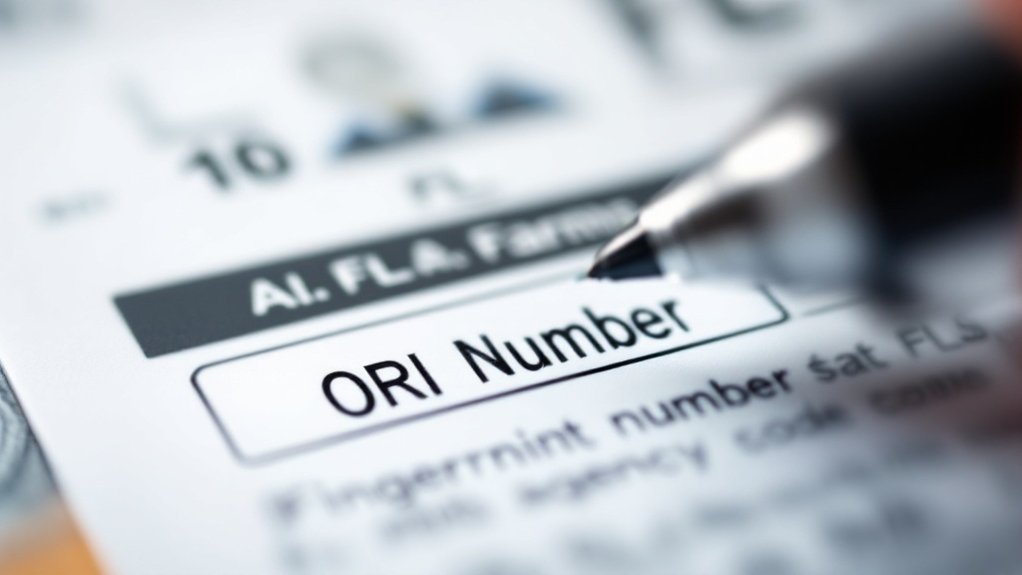
Comprehending ORI numbers is indispensable for maneuvering Level 2 background checks in Florida. These identifiers guarantee that results are routed correctly to the requesting agency, informing the FDLE and FBI about relevant statutes and destinations. Examples include EAHCA020Z for the Agency for Health Care Administration and EDCFGN10Z for the Department of Children and Families. Without the correct ORI number, background checks may be invalid or misdirected. You will typically receive your ORI number during the application process for licenses or from your employer for employment-related checks. It’s imperative to verify the accuracy of this number to confirm smooth processing. Additionally, knowing your ORI number is crucial because it ensures that the background check results are sent to the appropriate state department, such as the Florida Department of Health or the Department of Children and Families.
ORI Number Structure and Purpose
When you’re involved in a Level II background check in Florida, understanding the structure and purpose of ORI numbers is essential. ORI numbers are typically 9-digit codes, often starting with two characters identifying the state or agency, followed by six to seven additional characters. They uniquely identify the requesting agency and guarantee results are sent to the correct regulatory agency.
- Routing Function: Ascertains background check results are sent to the right agency.
- Statutory Compliance: Informs law enforcement about specific statutes governing the check.
- Result Delivery: Facilitates electronic delivery of results to the appropriate state department.
The ORI number plays a crucial role in ensuring that background check results are processed correctly, as it must be provided by the agency requiring the check, and any changes to the ORI number should be obtained directly from that agency to avoid delays.
Types of Background Checks in Florida
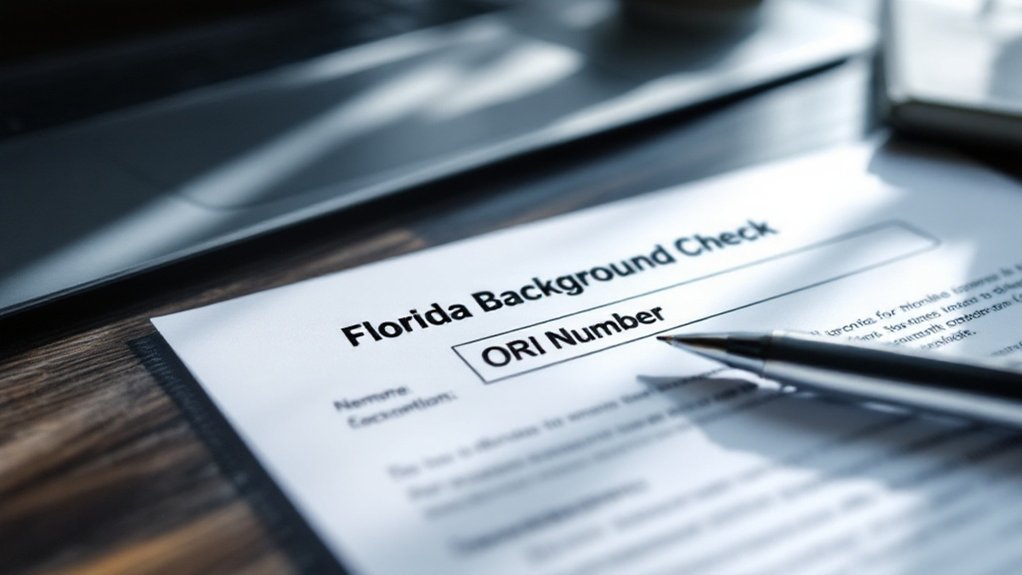
When conducting background checks in Florida, you will encounter two primary types: Level 1 and Level 2. Level 1 checks are name-based, state-only screenings that cover employment history, state criminal records, and sex offender registry checks, sometimes including a credit check. Level 2 checks are more expansive, requiring fingerprinting for both state and national criminal history searches through the FDLE and FBI, making them mandatory for high-risk industries like healthcare and childcare. Additionally, Level 2 checks are often required by state agencies for professions that involve working with vulnerable populations, such as those in childcare.
Types of Background Checks in Florida
In Florida, conducting background checks is an essential step in ensuring safety and security across various sectors, including employment, childcare, and healthcare. These checks are categorized mainly into Level 1 and Level 2, each serving different purposes and industries.
- Level 1 Checks: Basic, name-based state checks for low-risk jobs.
- Level 2 Checks: Exhaustive, fingerprint-based checks for high-risk industries like healthcare and education.
- Regulatory Compliance: Florida has strict regulations, especially for Level 2 checks, which require fingerprinting and national criminal record checks.
Level 1 Checks
Level 1 background checks in Florida are state-only, name-based screenings that provide essential information for hiring purposes. They include employment history, statewide criminal records, and sex offender registry checks, making them suitable for low-risk positions due to their affordability and efficiency. These checks reveal the presence of criminal history but lack detailed offense information. Employers typically initiate Level 1 checks to verify employment and educational credentials, and they must comply with Florida statutes regarding prohibited offenses. While they are cost-effective and commonly used in the private sector, they are not typically required for high-risk industries like healthcare or education. Additionally, Level 1 checks do not require an ORI number, which is a crucial component for more comprehensive background screenings like Level 2 checks.
ORI Numbers for Specific Agencies
To navigate the complex landscape of background checks in Florida, understanding the specific ORI numbers for various agencies is pivotal. You need to know these numbers to guarantee your background check results are sent to the correct agency. Here are some key ORI numbers to ponder:
- Healthcare Agencies: AHCA uses EAHCA020Z for general purposes, while DOH uses EDOH0380Z for CNAs.
- Social Services: DCF General uses EDCFGN10Z, and the Department of Elder Affairs uses EDOEA310Z.
- Financial Agencies: Florida Mortgage Loan Originators use FL737111Z, and Mortgage Brokers use FL921050Z.
Obtaining an ORI Number
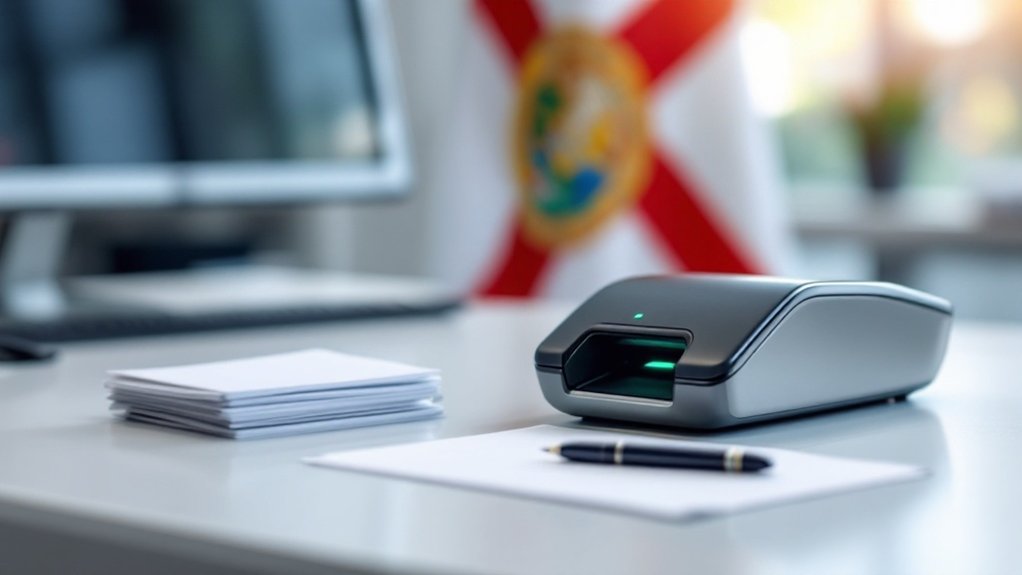
Now that you’re familiar with the specific ORI numbers used by various agencies in Florida, it’s time to focus on how you can obtain an ORI number. Typically, you’ll receive your ORI number during the application process for licenses or from your employer if you’re undergoing a background check for a job. If your employer doesn’t have the ORI number, they can contact the relevant regulatory agency to obtain it. For court-related matters, you can ask the Clerk of Court for the necessary information. It’s paramount to verify the ORI number with the requesting agency to guarantee accuracy and successful processing of your background check. Additionally, ensuring that you have the correct ORI number is crucial because it serves as a unique identifier for the agency requesting the background check.
VECHS and OCA Numbers Explained
When conducting background checks in Florida, understanding the roles of VECHS and OCA numbers is crucial for guaranteeing compliance and accuracy. VECHS numbers are used by organizations like schools and daycares to manage employee and volunteer background checks. OCA numbers, on the other hand, are used to identify the recipient of background check results, particularly for DCF-regulated entities. Key aspects of VECHS and OCA numbers include:
- VECHS Usage: Commonly used by schools and daycares for employee and volunteer checks.
- OCA Structure: Typically numerical, starting with “111,” and used by DCF.
- Purpose: Both confirm accurate routing of background check results to the appropriate agencies. In Florida, background checks often require an ORI number to ensure that the results are sent to the correct agency, which is essential for maintaining compliance with state regulations.
Legal and Regulatory Framework for Background Checks
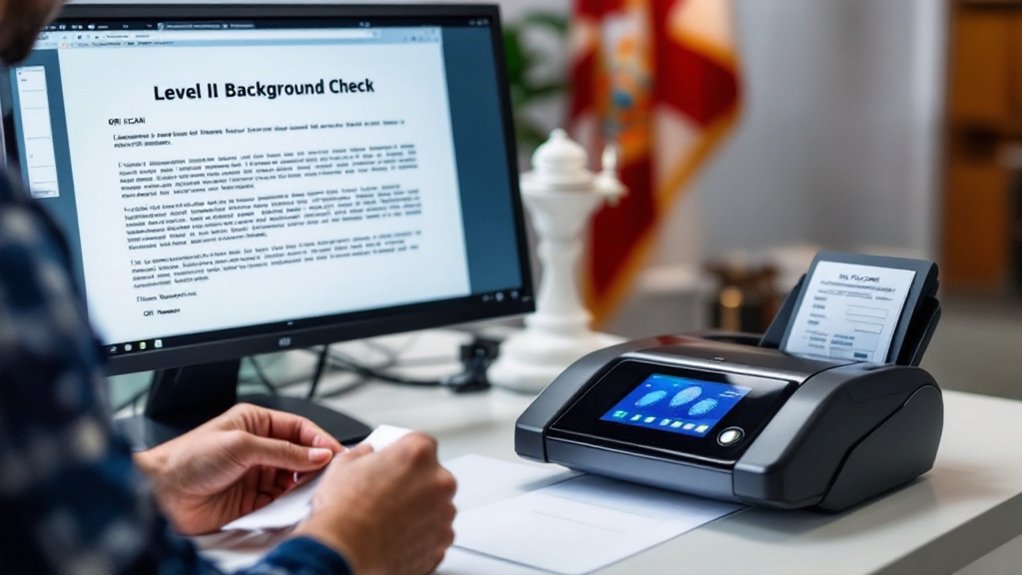
Understanding the legal and regulatory framework for background checks in Florida is pivotal for ensuring compliance and fairness in hiring practices. The Fair Credit Reporting Act (FCRA) regulates how consumer reporting agencies handle personal information, including background checks for employment purposes. Employers must obtain written consent and follow the adverse action process if not hiring based on a report. The Equal Employment Opportunity Commission (EEOC) enforces laws against employment discrimination, while Florida Statutes 435 and 112.011 provide additional guidelines for specific sectors and crimes. Compliance with both state and federal laws is essential for conducting background checks. In Florida, background checks often involve a fingerprint-based process, such as Level 2 checks, which are required for positions of trust or responsibility, including roles in healthcare and education.
The Role of FDLE in Background Checks
The Florida Department of Law Enforcement (FDLE) plays a critical role in conducting background checks, particularly in guaranteeing public safety by verifying criminal backgrounds for sensitive roles. You can depend on FDLE for extensive checks that cover both state and national databases.
- Criminal History Review: FDLE reviews an individual’s criminal history, including arrests and convictions.
- Authorized Access: Only authorized entities can request FDLE background checks, safeguarding privacy protection.
- Thorough Checks: FDLE checks are comprehensive, involving both state and national databases to ensure precision and completeness.
Professions Requiring ORI Numbers
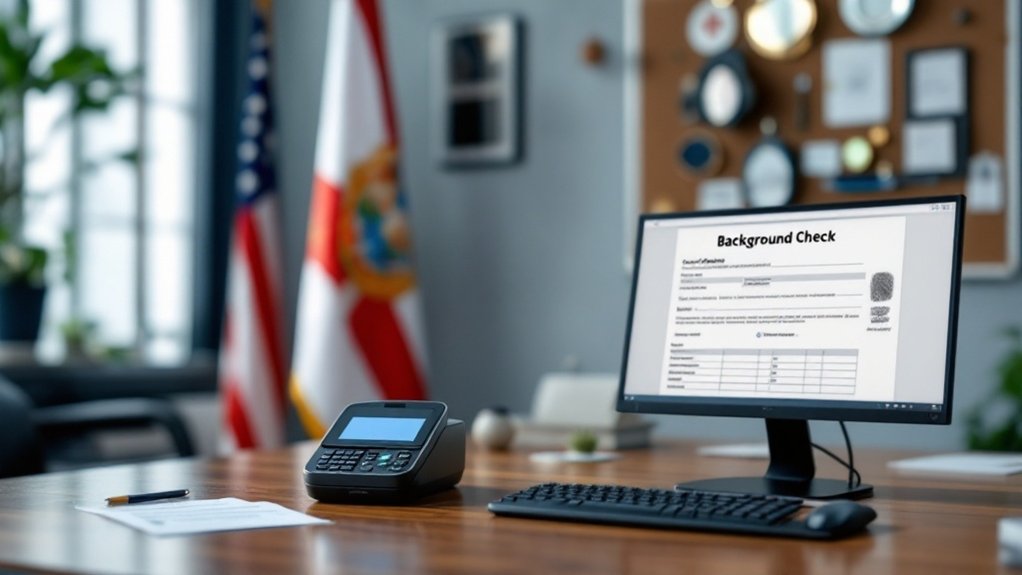
How do you determine which professions require an Originating Agency Identifier (ORI) number for background checks in Florida? You can identify these professions by looking at the specific codes assigned to them. For instance, healthcare professions like Certified Nursing Assistants (EDOH0380Z), Physicians (EDOH2014Z), Osteopathic Physicians (EDOH2015Z), Chiropractic Physicians (EDOH2016Z), and Podiatric Physicians (EDOH2017Z) each have unique ORI numbers. Similarly, financial and real estate professions, such as Florida Mortgage Loan Originators and Real Estate Sales and Brokers, have their own codes. These ORI numbers are essential for conducting background checks in these fields. In Florida, an ORI number typically includes an agency abbreviation, such as AHCA, to ensure that background check results are sent to the correct state department.
Submission Process for ORI Numbers**
When submitting an ORI number for a background check in Florida, you’ll need to follow a specific process to guarantee that your fingerprints are processed correctly. The ORI number ascertains that results are sent to the correct agency. Here are key steps to confirm accurate submission:
- Provide the ORI Number: Give the ORI number to the Livescan service provider.
- Use Approved Providers: Verify fingerprints are submitted through an FDLE-approved Livescan service provider.
- Verify the ORI Number: Confirm the ORI number with the requesting agency to avoid errors.
This process guarantees compliance with Florida regulations and prevents delays in processing your background check.
Conclusion
Traversing Florida’s background check landscape is like charting a precise course through complex waters. ORI numbers serve as your compass, guaranteeing that background checks are processed correctly and results are delivered to the right agency. These unique identifiers are pivotal for Level II checks, guiding the process from start to finish. By understanding and using the correct ORI number, you can ensure your background check reaches its intended destination efficiently.

